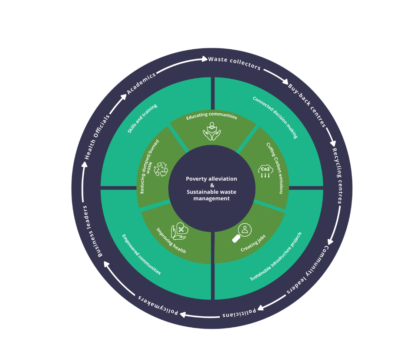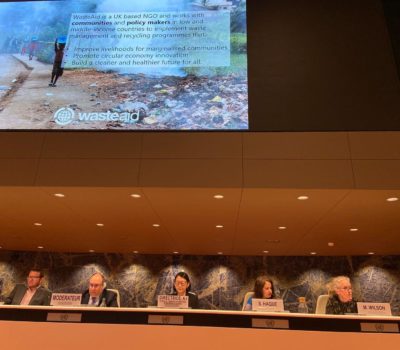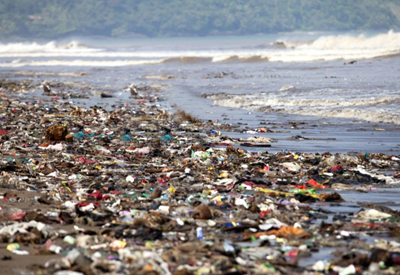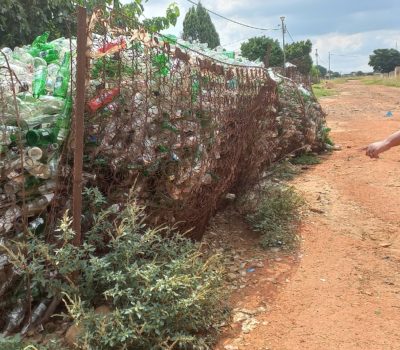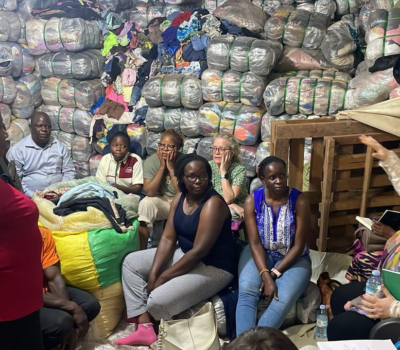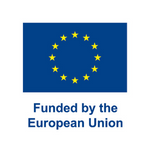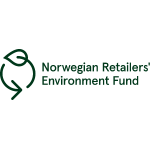Why National Governments and the International Community Should Give More Attention to Waste Management as a Climate and Air Pollution Issue
Thought Pieces
Author: Guest Author
Published: 27 June 2022
A thought piece from Sandra Mazo-Nix, United Nation’s Climate and Clean Air Coalition, on the why national governments and the international community should give more attention to waste management as a climate and air pollution issue.
What is the role of waste management to mitigate climate change and improve air quality?
Improving waste management is critical to global efforts to reduce air pollution and the threat of climate change. Specifically, by reducing short-lived climate pollutants (SLCP) like methane and black carbon, which both contribute to dangerous air pollution and are many times more powerful that carbon dioxide at warming the planet. Improved waste management also delivers local environmental, economic, and health benefits.
The sources of methane and black carbon can be found throughout the supply chain providing multiple points where emissions reductions can occur. Methane emissions, for example, can be reduced from farm to table by improving farming practices, transportation, distribution, retail practices, and how waste is managed in the home. Likewise, black carbon can be mitigated by eliminating the use of high-emitting diesel vehicles, preventing landfill fires, and eradicating open-burning of waste.
Atmospheric methane concentrations are increasing at the fastest rate since systematic measurements began. Increasing volumes of organic waste in dumps and landfills is contributing to this. Globally, about 44 per cent of municipal solid waste is food and green waste; other sources of organic waste like paper, cardboard, and wood account for another 23 per cent. The problem is even higher in middle- and low-income countries where the generation of food and green waste is 53 per cent and 57 per cent, respectively. Municipal solid waste is now the third largest source of anthropogenic methane emissions, or 20 per cent of all human-caused methane emissions.
Stopping or diverting organic waste from reaching dumps and landfills can help prevent methane emissions. Reducing the amount of organic waste in landfills, particularly food waste, means reconsidering the food supply chain and actions like distributing surplus food to vulnerable communities. Eliminating wasteful food consumption patterns is also necessary and requires a big shift in human behaviour. Steps to tackle organic waste would solve a large part of the waste problem and contribute to the management of other types of waste.
The proper management of organic waste highlights how a circular economy can function. Instead of just winding up in landfill, organics can be turned into valuable bio-based products like organic fertilisers and biogas. The circularity of organic materials has been proven and is feasible globally. Optimising composting and bio-digesting can reduce dependence on chemical fertilisers, help restore soil fertility and improve soil water retention, and improve nutrient transport to plants.
Approximately 55 per cent of waste is disposed in open landfills and dumps around the world. Methane emissions from these sites must be prevented. One way to do this is by installing gas collection systems. Unfortunately, only 7.7 per cent of landfills globally have landfill gas systems. Installing gas systems is imperative in all countries that still use landfills. These systems collect and burn biogas generated by the organic waste, thus eliminating methane emissions. The inclusion of a landfill gas system starts ideally at the planning phase of the waste management for any city or region. Installing a landfill gas system after the landfill has been established can be challenging for most municipalities in low- and middle-income countries if the costs to retrofit the landfill and to install the landfill gas system have not been included in the waste management budget. Likewise, care should be given to the operations of the landfill since this impacts the efficiency of the landfill gas system. The conditions of the landfill, like daily and/or intermediate covers, slopes, fire control, compaction, final capping, planned filling operations and the existence of a leachate collection and removal system, all impact the landfill gas generation, the amount of methane in the landfill gas, and the collection efficiency of the landfill gas system.
40 per cent of waste worldwide is burned, making the waste sector responsible for five per cent of global anthropogenic black carbon emissions. The open burning of waste and landfill fires also significantly contributes to local and regional air pollution.
For many cities, the growing waste burden is becoming increasingly difficult to manage. Ineffective municipal waste management often leads to uncontrolled dumping, open burning, plastic waste in the oceans, water contamination, poor public health, and missed economic and development opportunities. There is much that needs to be done by everyone to improve waste management.
What is the role of governments?
Even though the Intergovernmental Panel on Climate Change’s Fifth Assessment Report says that three to five per cent of global greenhouse gas emissions come from the waste sector, the sector’s potential to reduce these emissions have been historically underrated. This is because accounting methodologies tend to only look at the disposal aspect of waste management. This has led to national governments not prioritising the waste sector in their mitigation efforts, not recognising waste as part of the climate problem, and not creating frameworks to enable better waste management systems in cities and throughout the country.
Air pollution is another clear area where the connection with waste management is often overlooked. There is great potential to make significant improvements by preventing waste generation, improving waste collection to reduce open burning, improving the operations of landfill and landfill gas systems, and closing open dumps.
National governments can play an important role in increasing emissions reductions in the waste sector. More must be done to engage them in mitigation activities and help build political support that can advance enhanced action, including at the sub-national and local levels.
A governance framework is needed to mitigate methane and black carbon from the waste sector. For example, cities trying to minimise and add value to organic waste need to have policy measures and enabling national legislation that allow the implementation of organic waste projects. This includes passing regulations and laws that prevent and divert organic waste, and policies that incentivise bio-based products and valuable organic waste byproducts like compost, digestate, and biogas. Institutional frameworks need to be assessed to ensure that national strategies and international commitments are not disconnected from municipal efforts to meet improved waste management standards.
How can the international community assist?
Organic waste is the largest component of waste in many countries. Even in high-income countries where food and green waste makes up a smaller percentage of waste, there is still a large amount of paper, cardboard, and wood. Tackling organic waste requires the collaboration of everyone. The world needs a clearly formulated joint vision to value and prevent organic waste. This includes having ambitious global goals that are measurable, time-bound, and achievable.
The international community needs to continue helping cities and countries improve organic waste management and prevent the open burning of waste. For example, the international scientific community needs to provide guidance on feasible solutions to treat organic waste and assess the effectiveness of existing and proposed measures. Scientists also need to improve estimates of black carbon emission factors and the global impact of uncontrolled waste burning. The latest knowledge, information, and solutions should be available and shared on accessible platforms.
The international community must also provide aid to countries to develop national strategies, with targets, reporting, and monitoring mechanisms. The aid should include technical and operational assistance to implement those strategies. The international community should help develop specific measures and protocols for addressing sector-specific challenges, and tailoring them to be applied by region, degree of development, and locality.
Furthermore, a finance mechanism is needed to mobilise and channel public and private funds to countries, municipalities, and other stakeholders to create the enabling conditions necessary to implement national action plans, strategies, local waste management systems, and projects.
Finally, it is important to remember and focus on the multiple benefits that come from preventing organic waste and open burning. These practices not only lead to overall improvements in waste management but also achieve climate mitigation, improved air quality, and health, economic and development benefits.
Improving waste management is a recognised strategic area of intervention for cities to contribute to the global delivery of the Paris Agreement targets and is directly related to several of the Sustainable Development Goals, including the progress towards no poverty, zero hunger, clean water and sanitation, clean energy, infrastructure innovation, reduced inequality, sustainable cities, responsible consumption, climate action, and several others.
About the Author
Sandra Mazo-Nix has a Bachelor of Science in Engineering Management from the National University of Colombia, and a Master of Science in Environmental Science and Policy from George Mason University (Virginia, United States). As part of her graduating thesis for her bachelor degree, Ms. Mazo-Nix conducted a research project to evaluate the feasibility of a recycling program at a bottling plant in Medellín, Colombia. Ms. Mazo-Nix joined Climate and Clean Air Coalition (CCAC) as the Municipal Solid Waste (MSW) Initiative coordinator in January 2016.
Ms. Mazo-Nix has over 14 years of experience focusing on environmental policy issues, solid waste management, and the mitigation of climate change. She has also worked on projects related to landfill gas generation and recovery modeling and reporting, landfill gas utilization cost analyses and electricity market research. The Solid Waste Association of North America (SWANA) has certified her as Recycling Systems Manager and Composting Programs Manager.
Sandra Mazo-Nix has been the coordinator for the work on the municipal solid waste (MSW) sector of the Climate and Clean Air Coalition (CCAC) since January 2016. Ms. Mazo-Nix has over 14 years of experience focusing on environmental policy issues, solid waste management, and the mitigation of climate change. She has a Bachelor of Science in Engineering Management from the National University of Colombia, and a Master of Science in Environmental Science and Policy from George Mason University (Virginia, United States).

